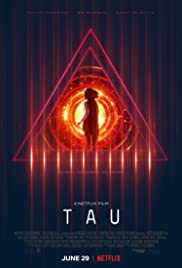
TAU
US, 2018, 97 minutes, Colour.
Maika Monroe, Ed Skrein, Gary Oldman.
Directed by Federico D' Alessandro.
While Tau is the 17th letter of the Greek alphabet, the film’s title is also based on the initials of the young millionaire scientist, experimenting with artificial intelligence, a latter-day Dr Frankenstein, Thomas Alex Unger.
This is an American production, made in Serbia.
Initially, the audience is introduced to a redheaded young woman walking through darkened streets, pickpocketing her way to the pawn shop. The audience sees that she is probably being stalked by an anonymous man. She returns to apartment but is then seized and abducted.
She wakes to find herself bound and gagged in the most elaborate building, luxurious, multi-rooms, laboratories, living spaces, and a glance at a cover of Forbes to explain the sinister character, Alex (Ed Skrein), an inventor working on extracting knowledge from subjects and developing lucrative international contracts. There have been several failed experiments.
The young woman, Julia (Maika Monroe), becomes the subject of experimentation, finally seeing Alex who is a young man, dapper in his manner, living in isolation, self-contained, dining well but abstemiously, no relaxation to be seen. Julia at times gets free, enlists the aid of some of the other victims but they are killed and she is re-imprisoned.
The audience is also introduced to a master computer, Tau, voiced by Gary Oldman, at times sinister, at other times subservient to Alex, gradually mellowing as he engages in conversation with Julia. Tau manages Alex’s life completely, greeting him, providing meals, giving information. He is also the instrument for Alex’s administering punishment – and, as Tau’s attitude changes when he and Julia engage in conversation, his learning what a person is, becoming friendly with Julia, her reading books to him and their exchanging knowledge about prehistoric times, and his drawing on his computer file of music that Alex has given him, his voice becomes more humane.
The production values of this film are very high, a very expensive look for the layout of Alex’s mansion and laboratories.
Alex is put under pressure, daily reminded of the deadline by Tau, under pressure, making demands of Julia with tasks which will give him information, Julia resisting, attempting escapes. Alex also has a mechanically constructed monstrous creature to put down any rebellion on Julia’s part.
As expected, there is a buildup to a strong climax, Julia with Tau helping her to escape, the confrontation with Alex and her severing his hand to use as a code to escape, the control taken from his building and the literal collapse and downfall of Alex and the building, and the screenplay reminding us of humanity with Tau and his confusion in the crisis, the removal of his memory, his powers surviving in a small grenade-like mechanism – and the question as to whether Julia will survive, whether Tau will survive – and will he recover his memory and have a future?
An above-average contribution to science-fiction about artificial intelligence.
1. The title? Symbol, Alex’s initials? The technical acronym?
2. Science-fiction, technology-fiction, futuristic, artificial intelligence?
3. The visual design of the film, the dingy streets, the pickpockets? The pawn shop? The contrast with Alex’s house, vast, beautiful, the laboratories, the cells, the machines, the mechanical monster? Tau and the visuals? Action, experiments, punishment and torture?
4. The pace of the film, the development of the plot, the atmospheric score?
5. Alex and his plan, the cover of Forbes Magazine, young, billionaire, his experiments and inventions, machinery, computers? Artificial intelligence, his experiments, contracts and the holograph meetings? The pressure of the timeline?
6. The initial stalking of Julia, Julia and her dress and wig, the pickpocketing, going to the pawn shop, her resentment? Going home, taking off her wig, relaxing? Her belief in her creating herself? The abduction?
7. The audience sharing Julia’s terror, waking, bound and gagged, the other members of the experiment? The confrontation with Alex? The attempted escape, the deaths of the others, her survival?
8. Alex, in himself, the solitary life, prim and proper, his relationship with Tau, the talk, Tau administering his life? His interactions, his work, his arrogance, meting out punishment?
9. The experiments and his seeking human knowledge, the connections into the victims’ necks? Connections to the computer? His allotting tasks and monitoring them?
10. Tau, the machine, artificial intelligence, a complex computer, the voice, the manner, love of music? Julia talking to him as a person? His beginning to change, understanding person, communication, her reading the books, the knowledge, prehistoric times? Love of music, his music store? Alex and the threats to delete this?
11. Tau and his eventual defiance, Alex’s anger, Julia and her promises? The threats, the timeline, Julia escaping with Tau’s help, the escape route? The mechanical monster?
12. The return, the fight with Alex, Alex interrogating Tau, punishing Tau?
13. The final threat, extracting his music, Tau submitting?
14. The issues of the nature of person, the purpose of persons, communication, creating oneself, being for others, not wanting to be annihilated? Meaning for life, not an insignificant life?
15. The buildup to a climax, Tau and Julia, the attack, the fight, Julia severing Alex’s hand, using it to affect the codes and open the doors? The pursuit of the monster? The chase, Alex confronting Julia, the rubble falling on him? The collapse of the whole plant?
16. Tau, closing down, the small mechanism, Julia turning him on, gradual coming to life, the music, Julia instructing him again?
17. The freedom of getting out into the world, a bigger world, survival and life?